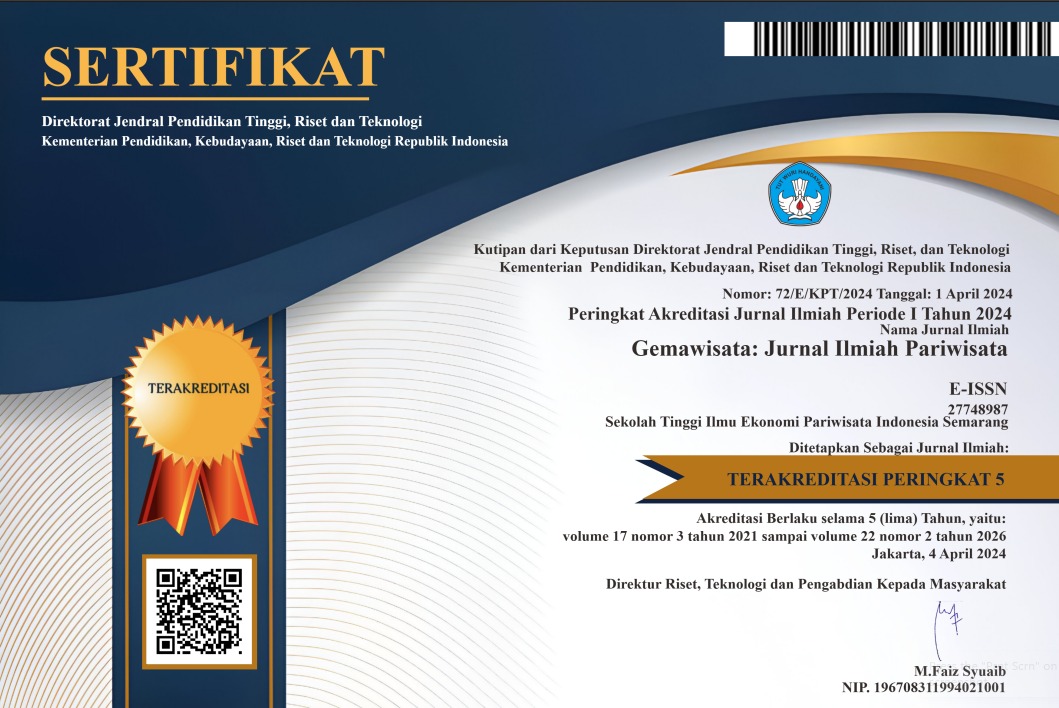Kontribusi Mahasiswa dalam Merealisasikan Kreativitas Diri Melalui Model Pembelajaran Special Event di Politeknik Pariwisata Prima Internasional
DOI:
https://doi.org/10.56910/gemawisata.v21i1.450Keywords:
Creativity, Special Event, StudentAbstract
Creativity is an activity that positively impacts human growth and development. One form of human growth and development is the output of creativity through an activity and a product. EPHICS emerged as a form of creativity from international prime tourism polytechnic students and involved students. Qualitative descriptive methods followed by observation and visualization of layouts assisted by the interview process and documentation to collect data related to research. As a result of this activity program, students make a field learning model that can continue to hone creativity and is expected to develop EPHICS even better. SWOT analysis and analysis of the concept of event implementation become the basis for the activity evaluation process. The evaluation results obtained after each activity is completed are used as material for improvement in the implementation of future EPHICS activities to make it even better.
References
Akhdan, F. S. 2020. Pengaruh Kreativitas Dan Inovasi Terhadap Kinerja Usaha Pada Himpunan Pengusaha Mebel Pasundan Cimahi (Doctoral dissertation, Universitas Komputer Indonesia).
Gutterman, D., & Aafjes Van-Doorn, K. 2022. An Exploration of the Intersection Between Creativity and Psychotherapy. Creativity Research Journal, 1(1), 1–12. https://doi.org/10.1080/10400419.2022.2127566
Huang, N. T., Chang, Y. S., & Chou, C. H. 2020. Effects of creative thinking, psychomotor skills, and creative self-efficacy on engineering design creativity. Thinking Skills and Creativity, 37, 100695. https://doi.org/10.1016/j.tsc.2020.100695
Isrososiawan, S., Rahayu, A., Wibowo, L. A., & Dewatmoko, S. 2020. Green Human Resources Management Mendukung Kinerja Lingkungan Industri Perhotelan. Jurnal Co Management, 3(2), 457–470. https://doi.org/10.32670/comanagement.v3i2.425
Kanah, K., Sumawidari, I. A. K., & Oka, I. M. D. 2019. Analisis Kompetensi Mahasiswa Program Studi Perhotelan. Epigram, 16(1), 19–28. https://doi.org/10.32722/epi.v16i1.1416
Mailangkay, F. A., Mangantar, M., & Tulung, J. E. 2021. Reaksi Pasar Modal Terhadap Penerapan Kebijakan PSBB Pada Industri Perhotelan yang Terdaftar di Bursa Efek Indonesia. Jurnal EMBA, 9(3), 640–647. https://doi.org/10.35794/emba.v9i3.34959
Napsawati, N. 2020. Analisis situasi pembelajaran IPA Fisika dengan metode daring di tengah wabah covid-19. Karst: jurnal pendidikan fisika dan terapannya, 3(1), 6-12.
Nurjanah, N. E. 2020. Pembelajaran stem berbasis loose parts untuk meningkatkan kreativitas anak usia dini. Jurnal audi: jurnal ilmiah kajian ilmu anak dan media informasi paud, 5(1), 19-31.
Puspita, D. A., Muchlas, M., & Kuat, T. 2020. The Implementation of Teaching Factory to Improve Student Interest in Entrepreneurship at Multimedia Competencies. Journal of Technology and Humanities, 1(2), 42–50. https://doi.org/10.53797/jthkkss.v1i2.5.2020
Putra, H. M. A., & HS, C. O. 2023. Implementasi Penataan Layout Ruang Dan Kawasan Pada Redesain Bangunan Pemerintah. Jurnal Kreatif: Desain Produk Industri dan Arsitektur, 11(1), 30-36.
Sitharesmi, R. D. 2022. Exploring Dance Aesthetic in Contemporary Choreography at Universitas Negeri Gorontalo. International Journal of Creative and Arts Studies, 9(1).


1_(1).jpg)






